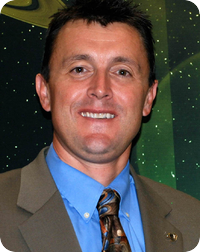The View From Here
The View from Here
Written by: developer
 If you attended last month's National Space Symposium, you may have noticed a very strong underlying theme -- education. Yes, science, technology, engineering and mathematics (STEM) education activities have always been a huge part of our Symposium program and, yes, education is a major plank in the Space Foundation's mission. But, this year, was a quantum leap.
If you attended last month's National Space Symposium, you may have noticed a very strong underlying theme -- education. Yes, science, technology, engineering and mathematics (STEM) education activities have always been a huge part of our Symposium program and, yes, education is a major plank in the Space Foundation's mission. But, this year, was a quantum leap.
Let's examine what went on in Colorado Springs -- and then look at what's on the horizon.
Last month, we hosted almost 100 teachers from around the nation and over 1,800 students from Colorado's Front Range. The teachers, all members of our elite Teacher Liaison corps, participated in workshops, listened to former Space Shuttle Commanders and some even had a field trip to a Colorado Springs-based GPS company, NAVSYS (to see a related story, click here). The younger students participated in Audience with an Astronaut programs co-sponsored by ADD STAFF and Maui Economic Development Board (MEDB) and the high school students toured the Boeing Exhibit Center, making stops along their route at destination booths, where they heard special presentations designed to spark their interest in space.
We hosted a special "Introduction to Chinese Culture and Space Activities" session to give a group of 140 local students who are studying the Mandarin language insight into the Chinese space program as presented by a member of the Chinese delegation attending the Symposium.
The annual presentation of the Alan Shepard Technology in Education Award was especially meaningful to me because, this year, it was presented to a very good friend of the Space Foundation and an educator who believes as strongly as we do in the need to improve STEM education in this nation. Charles County Public Schools (CCPS) Superintendent James E. Richmond's innovative, hands-on space-themed education programs are excellent examples of how communities and schools can work together to inspire children to learn and achieve.
The Symposium's Corporate Partnership dinner, which is held to honor and recognize the Space Foundation's corporate members, had an education theme. It opened with a video chronicling extraordinary education programs sponsored and conducted by many of our partners and featured Dr. Craig Barrett, retired Intel CEO and chairman and well-respected education advocate, as the keynote speaker. Dr. Barrett spoke about the very issues in education that the Space Foundation and its partners are trying to address. To read more, click here.
Onsite, our partners stepped up even more. The United Space Alliance had planned on presenting a $5,000 classroom grant during the 27th National Space Symposium to one of the attending Teacher Liaisons -- based on a competition of innovative space-based classroom lessons and activities around the theme, "Human Space Travel in the Year 2020." USA's plan didn't work out quite as they expected; they were so impressed with the applications, that they doubled their contribution on the spot, giving $5,000 each to two teachers. To read about it, click here.
Another new activity at National Space Symposium this year was a student art contest co-sponsored by ARES Corporation, Fisher Space Pen Co. and the Space Foundation. Students in pre-kindergarten through 12th grade submitted original artwork depicting the same theme the teachers competed on, "Human Space Travel in the Year 2020," resulting in entries from more than 150 students in 13 states. We recognized the winners at a special ceremony featuring two astronauts. To read more and see the winning art, click here.
The atmosphere for education was so rich at the National Space Symposium that NASA also chose to recognize winners of its national 2010 NASA OPTIMUS PRIME Spinoff Award student video contest at the Symposium.
It was certainly gratifying to see education take on such an important role at an event that is essentially an industry and networking forum. And it makes it very clear that the entire space community shares our concerns about our nation's proficiency in STEM subjects and about our ability to build a competitive technology workforce for the future. And, it also underscores our belief -- also articulated quite strongly by Dr. Barrett -- that educational success in the country will require private sector commitment and involvement.
And, to that point, the Space Foundation has a year-round education commitment. In fact, despite what might appear to be our "big" season at the Symposium, those programs are just a sampling of the aggressive programs we have going on all year long and the intense activity we have planned for this summer.
This month we'll open a long-planned and very special addition to the Space Foundation Discovery Institute in Colorado Springs, the Mars Yard. This simulated Martian terrain will incorporate the "Honeywell Mars Robotic Experience," (read more here) helping students to learn robotics while gaining a hands-on sense of exploring the red planet.
Space Foundation summer professional development courses - Space Across the Curriculum - will be offered this summer in three locations: Colorado Springs and Pueblo, Colo., and Charles County, Md. For details on the Colorado courses, click here.
These programs are possible through the generous support of both individuals and corporate partners, all of whom have the Space Foundation's deepest gratitude and respect. But, they wouldn't work if it weren't for the educators who sacrifice their personal time to learn and develop lessons and projects so that they can deliver extraordinary, inspiring and effective education to their students... so they can build the workforce of tomorrow... and so they can make a difference where a difference is most sorely needed.
Iain Probert
Space Foundation Vice President - Education
This article is part of Space Watch: May 2011 (Volume: 10, Issue: 5).
